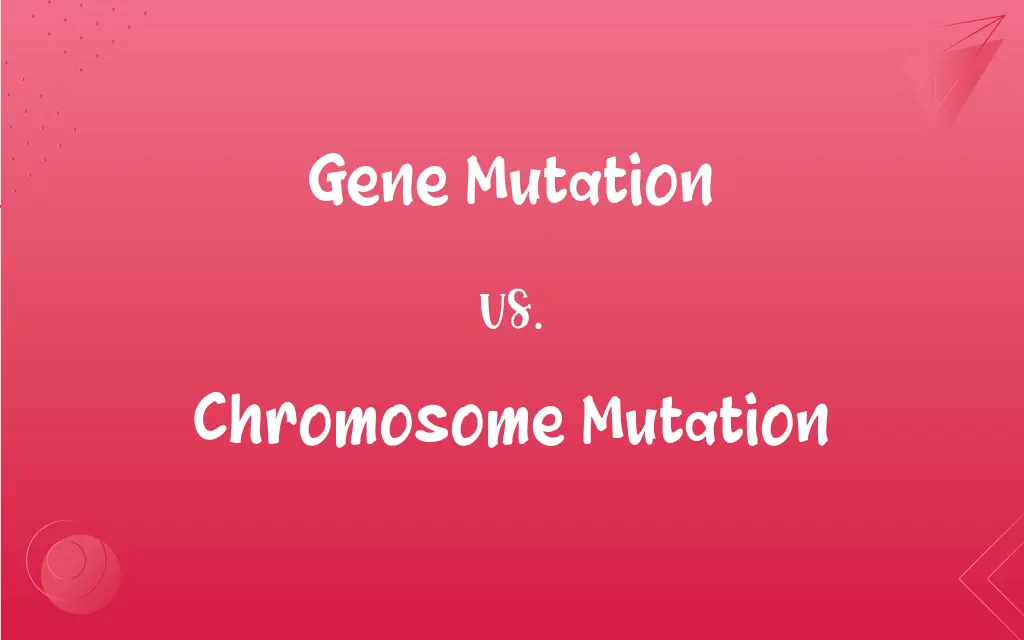Gene Mutation vs. Chromosome Mutation: What's the Difference?
Edited by Janet White || By Harlon Moss || Updated on October 29, 2023
Gene mutation involves changes in the nucleotide sequence of a gene, while chromosome mutation involves changes in the structure or number of chromosomes.

Key Differences
Gene mutations are changes that occur in the sequence of nucleotides in a gene. These changes can be as small as a single base pair or involve larger segments of the gene. Gene mutations can occur spontaneously or be induced by environmental factors such as radiation or chemicals. In contrast, chromosome mutations involve changes in the structure or number of chromosomes. These mutations can occur during cell division when chromosomes do not separate properly, leading to aneuploidy, or when parts of chromosomes break off and reattach incorrectly, leading to structural changes such as translocations, deletions, and duplications.
Gene mutations can have a range of effects on the organism, from no effect at all to serious consequences such as genetic disorders or cancer. The severity of the effect depends on the specific mutation and its impact on the function of the gene. On the other hand, chromosome mutations generally have more severe effects as they involve changes to larger segments of DNA, which can affect many genes at once. These mutations can lead to developmental abnormalities, genetic disorders, and cancer.
Gene mutations can be classified into several types, including point mutations, insertions, deletions, and duplications. Each type of mutation involves different changes to the nucleotide sequence of the gene. Similarly, chromosome mutations can also be classified into different types, such as deletions, duplications, inversions, and translocations. Each type of chromosome mutation involves different changes to the structure or number of chromosomes.
Gene mutations and chromosome mutations are both important areas of study in genetics as they can provide insights into the causes of genetic disorders and cancer. Researchers study these mutations to understand how they occur, their effects on the organism, and how they can be prevented or treated. Both types of mutations are also used as tools in genetic research to study the function of genes and chromosomes in normal development and disease.
Comparison Chart
Changes in nucleotide sequence
Changes in structure or number of chromosomes
Nature of change
ADVERTISEMENT
Can be small or large
Generally involve large segments of DNA
Size of change
Can be spontaneous or induced
Can occur during cell division or due to structural changes
Cause of mutation
Can have a range of effects
Generally have more severe effects
Severity of effects
Can be classified into different types
Can be classified into different types
Classification of mutation
Gene Mutation and Chromosome Mutation Definitions
Gene Mutation
Gene mutations can have a range of effects on the organism.
Some gene mutations can lead to cancer.
ADVERTISEMENT
Chromosome Mutation
Chromosome mutations can be classified into different types.
Deletions, duplications, and inversions are types of chromosome mutations.
Gene Mutation
Gene mutations can occur spontaneously or be induced by environmental factors.
Exposure to radiation can induce gene mutations.
Chromosome Mutation
Chromosome mutations can occur during cell division or due to structural changes.
An error in cell division can lead to aneuploidy, a type of chromosome mutation.
Gene Mutation
Gene mutations are studied to understand their causes and effects.
Researchers study gene mutations to find treatments for genetic disorders.
Chromosome Mutation
A chromosome mutation is a change in the structure or number of chromosomes.
A deletion in a chromosome mutation can cause a genetic disorder.
Gene Mutation
Gene mutations can be classified into several types.
Point mutations and insertions are two types of gene mutations.
Chromosome Mutation
Chromosome mutations generally have more severe effects than gene mutations.
Chromosome mutations can lead to developmental abnormalities.
Gene Mutation
A gene mutation is a change in the sequence of nucleotides in a gene.
A single base pair change in a gene mutation can cause a genetic disorder.
Chromosome Mutation
Chromosome mutations are studied to understand their causes and effects.
Researchers study chromosome mutations to find treatments for genetic disorders.
FAQs
What are gene mutations?
Gene mutations are changes in the sequence of nucleotides in a gene.
What causes gene mutations?
Gene mutations can be caused by errors in DNA replication or by exposure to environmental factors.
How are chromosome mutations classified?
Chromosome mutations can be classified into different types, such as deletions, duplications, inversions, and translocations.
What is an example of a gene mutation?
A single base pair change in a gene can cause sickle cell anemia.
What is an example of a chromosome mutation?
An error in cell division can lead to Down syndrome, a type of chromosome mutation.
What is the relationship between gene mutations and cancer?
Some gene mutations can lead to the development of cancer.
How are gene mutations used in research?
Gene mutations are used as tools in genetic research to study the function of genes.
What are some examples of diseases caused by chromosome mutations?
Down syndrome and Turner syndrome are examples of diseases caused by chromosome mutations.
What are chromosome mutations?
Chromosome mutations are changes in the structure or number of chromosomes.
What causes chromosome mutations?
Chromosome mutations can be caused by errors in cell division or by structural changes in chromosomes.
How are gene mutations classified?
Gene mutations can be classified into different types, including point mutations, insertions, deletions, and duplications.
What is the role of gene mutations in evolution?
Gene mutations can introduce new traits into a population, driving evolution.
How are chromosome mutations used in research?
Chromosome mutations are used as tools in genetic research to study the function of chromosomes.
How can gene mutations be prevented?
Some gene mutations can be prevented by avoiding exposure to environmental factors that can cause mutations.
What is the relationship between chromosome mutations and cancer?
Chromosome mutations can also lead to the development of cancer.
What are some examples of diseases caused by gene mutations?
Cystic fibrosis and sickle cell anemia are examples of diseases caused by gene mutations.
What are the effects of gene mutations?
Gene mutations can have a range of effects, from no effect at all to serious consequences such as genetic disorders or cancer.
What are the effects of chromosome mutations?
Chromosome mutations generally have more severe effects, including developmental abnormalities, genetic disorders, and cancer.
How can chromosome mutations be prevented?
Chromosome mutations can sometimes be prevented by ensuring proper cell division.
What is the role of chromosome mutations in evolution?
Chromosome mutations can also introduce new traits into a population, driving evolution.
About Author
Written by
Harlon MossHarlon is a seasoned quality moderator and accomplished content writer for Difference Wiki. An alumnus of the prestigious University of California, he earned his degree in Computer Science. Leveraging his academic background, Harlon brings a meticulous and informed perspective to his work, ensuring content accuracy and excellence.
Edited by
Janet WhiteJanet White has been an esteemed writer and blogger for Difference Wiki. Holding a Master's degree in Science and Medical Journalism from the prestigious Boston University, she has consistently demonstrated her expertise and passion for her field. When she's not immersed in her work, Janet relishes her time exercising, delving into a good book, and cherishing moments with friends and family.
































































